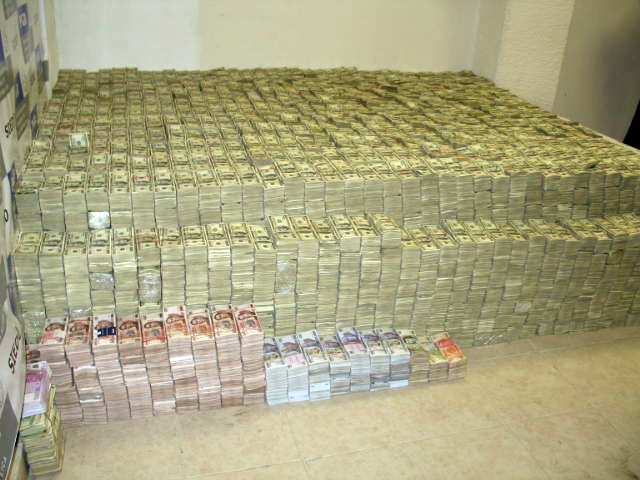 Quico says: So the Cuban government denies that it's getting Venezuelan oil for free, noting that La Isla pays for most of its oil bill through the services of Cuban doctors, sports trainers and other professionals in Venezuela.
Quico says: So the Cuban government denies that it's getting Venezuelan oil for free, noting that La Isla pays for most of its oil bill through the services of Cuban doctors, sports trainers and other professionals in Venezuela.Lets pick this one apart.
In the comments' section, Omar proposes the provocative concept of the Cuban-professional-to-oil-barrels terms of trade. The question is, what is the implicit cost to the Venezuelan treasury of a Cuban professional?
The short answer is, I don't know - and neither do you - because the terms of the deal are secret, and nobody knows precisely how many Cubans are working in the country. The original oil-for-Cubans treaty was never submitted to the National Assembly for approval, as the constitution mandates.
But lets guesstimate, generously, that there are 80,000 cubans working in Venezuela. We know that, last year, Cuba got $3.4 billion worth of oil shipments from Venezuela. Dividing $3.4 billion by 80,000 gives us an implied-cost-per-Cuban-per-year of $42,500.
Now, ask yourself this: how much of that does a Cuban professional actually get?
Turns out they get paid $2,400 per year, plus they get subsidised housing and food. Just to put a number to it, their all-in compensation package (wages + subsidies) might generously be estimated at $6,000 per year.
Fidel, on the other hand, gets seven times that much in Venezuelan oil.
To put it in terms chavistas can understand, the Cuban government made off with $36,500 in surplus value for each Cuban working in Venezuela last year. Or, in savage neoliberal terminology, their work in Venezuela was taxed at a rate of 86%...by a foreign government!
Granted, you can quibble with the numbers: they are admittedly (though necessarily) plucked from thin air. Cuba says it pays for about half its oil bill in cash: if true, then the cost-per-cuban-professional is less. Then again, 80,000 is a very high estimate of the number of Cuban professionals in the country: if there are fewer, then each one costs more.
That we even have to engage in this kind of speculation is a testament to the opacity of the whole deal. But whichever way you want to jig the numbers, the basic point stands: Fidel appropriates the lion's share of the remuneration for these people's work.
Because the basic issue here is one of ethics, not economics: Where the fuck does Fidel get off using his citizens' labor as payment for anything? If Chávez wants to buy professional services, how come it's Fidel that he pays, rather than the professionals? Are they Fidel's property?
In important ways, that's how they're treated. After all, when you want to rent a lawn-mower, you don't "pay" the lawn-mower, you pay its owner. And when Chávez wants to "rent" some Cubans, he doesn't pay the Cubans, he pays Fidel. Chávez and Fidel treat them as a rental good, as things whose use they're entitled to buy, sell or barter.
The actual Cubans are bystanders to the transaction: little more than chattel. Realistically, they can't refuse to go, because they have no negotiating power vis-à-vis the government: no independent unions, no right to strike, no possibility of working for someone else. Cuban professionals face a complete labor monopsony: it's the commie way or the highway. So it's not surprising that, at the end of the day, the amount of money that reaches their pockets is a tiny fraction of the amount their "owner" gets.
Now, can you imagine what the Penns and Glovers, the Tuckers and Chavezes of the world would say if the US government tried to exploit people quite this crudely? Can you picture the howls of outrage?
And then...how would you feel if, tomorrow, your government decided that it was going to start "paying" for imports of, I dunno, French cheese with your labor? How would you react if your government told you it had a secret agreement with France and it was going to ship you off to Marseille, where you would be paid one-seventh of the value of the cheese your government would get in return for your work?
Any takers?
...didn't think so...
Added later: the title turn-of-phrase, "Revolutionary Surplus Value", (plusvalía revolucionaria) is one of the many rhetorical jewels in J.M. Briceño Guerrero's The Savage Discourse, which also includes this chilling, prophetic passage:
I've also seen - and I wish I hadn't - that the revolution, when it's carried out seriously and succeeds, brings forms of injustice and oppression even more abominable than the current ones. I've seen those new forms of injustice and oppression in the eyes and the words of the most sincere, hardest working, most loyal revolutionary leaders. They feel themselves messianic saviors, avatars of history; they think they know my interests, my wishes, my needs, better than I do; they don't consult me or listen to me; they've struck off on their own as my representatives, as vanguards in my struggle; they are paternalist tutors; they pre-configure today that future olympus where they will make all decisions for my well-being and my progress; they'll make the decisions and they'll impose them on me in my name, through fire and blood in my name.




